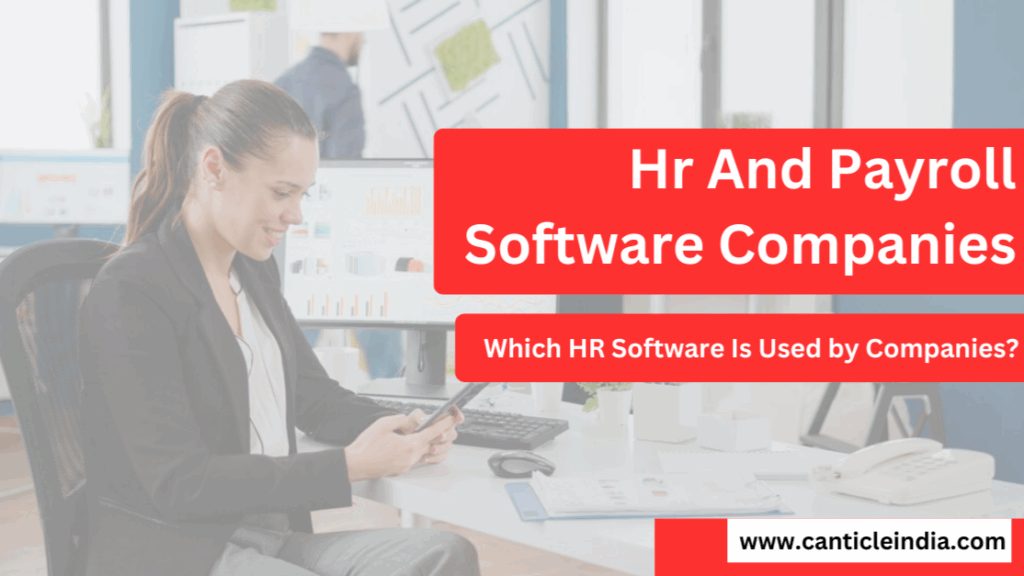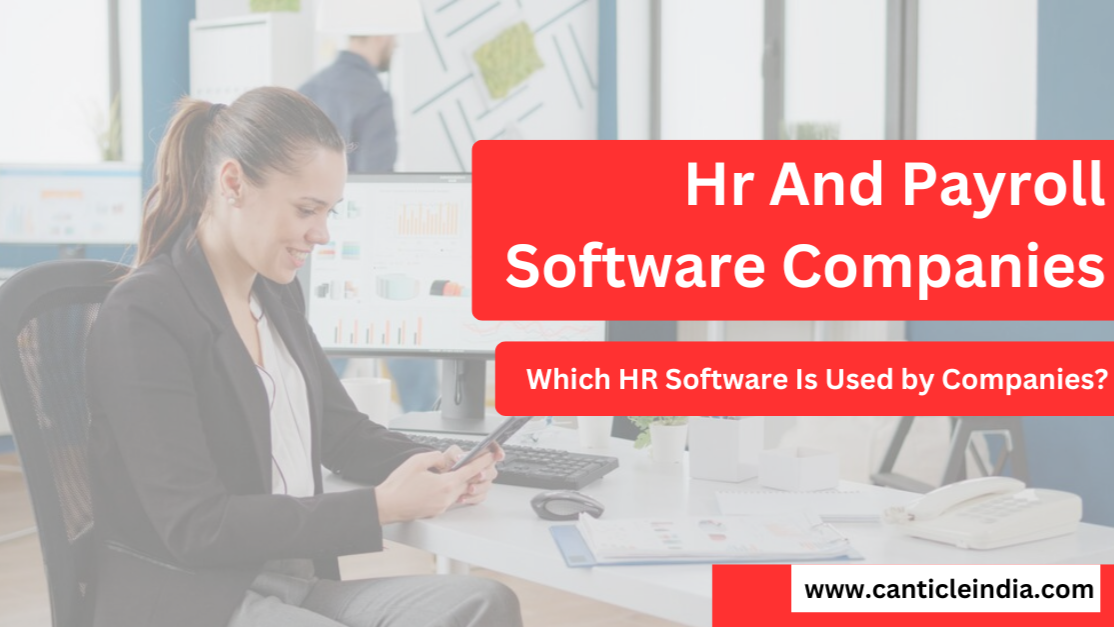
Choosing the Right HR Software Company: A Comprehensive Guide
In today’s fast-paced business environment, managing human resources effectively is crucial for organizational success. An efficient HR department ensures smooth operations, employee satisfaction, and compliance with legal regulations. One of the most significant investments a company can make to improve its HR processes is implementing robust HR software. Selecting the right HR software company is a critical decision that can significantly impact your organization’s efficiency, compliance, and employee satisfaction. This guide provides a comprehensive overview of factors to consider when choosing an HR software company.
Understanding Your HR Needs
Before embarking on the search for an HR software company, it’s essential to identify your organization’s specific needs and pain points. Conduct a thorough assessment of your current HR processes to determine areas that could benefit from automation and streamlining.
Assess Current HR Processes
Start by mapping out your existing HR workflows, including recruitment, onboarding, performance management, payroll, benefits administration, and employee training. Identify bottlenecks, manual tasks, and areas where errors are common. This assessment will provide a clear picture of the challenges your organization faces and the specific features you should look for in HR software.
Define Key Requirements
Based on your assessment, define your key requirements for HR software. Consider factors such as the size of your organization, the industry you operate in, and your budget. Create a list of essential features and functionalities that the software must offer. This list will serve as a roadmap during your evaluation process.
Evaluating Potential HR Software Companies
Once you have a clear understanding of your needs, you can begin evaluating potential HR software companies. Consider the following factors when assessing different vendors:
Features and Functionality
The core of any HR software is its features and functionality. Evaluate whether the software offers the specific features you need to address your identified pain points. Common features to consider include:
- Recruitment and Onboarding: Automates the hiring process, from posting job openings to onboarding new employees.
- Performance Management: Streamlines performance reviews, goal setting, and feedback processes.
- Payroll and Benefits Administration: Simplifies payroll processing, tax compliance, and benefits enrollment.
- Time and Attendance Tracking: Accurately tracks employee work hours, attendance, and time off requests.
- Learning and Development: Facilitates employee training and development programs.
- HR Analytics and Reporting: Provides insights into HR metrics and trends to inform decision-making.
Scalability and Flexibility
Choose an HR software solution that can scale with your organization as it grows. The software should be flexible enough to adapt to changing business needs and accommodate future expansion. Consider whether the software can handle an increasing number of employees, new locations, and evolving HR requirements. A good HR software company will offer scalable solutions designed to grow with your business.
Integration Capabilities
Ensure that the HR software can seamlessly integrate with your existing systems, such as accounting software, CRM systems, and other business applications. Integration eliminates data silos, reduces manual data entry, and improves overall efficiency. Check whether the HR software company offers pre-built integrations or APIs that allow you to connect the software with your existing technology stack. [See also: Streamlining HR Processes with Technology]
User-Friendliness and Training
The HR software should be easy to use and intuitive for both HR professionals and employees. A user-friendly interface reduces the learning curve and encourages adoption. Consider whether the HR software company provides adequate training and support to help users get up to speed quickly. Look for vendors that offer comprehensive documentation, online tutorials, and responsive customer support.
Security and Compliance
Data security and compliance are paramount when choosing HR software. Ensure that the HR software company has robust security measures in place to protect sensitive employee data from unauthorized access and cyber threats. Check whether the software complies with relevant data privacy regulations, such as GDPR and CCPA. A reputable HR software company will prioritize security and compliance to safeguard your organization’s data.
Vendor Reputation and Support
Research the reputation and track record of the HR software company. Read online reviews, check customer testimonials, and ask for references. A reputable vendor will have a history of providing reliable software, excellent customer support, and ongoing product updates. Consider the vendor’s financial stability and their commitment to investing in research and development. A stable and forward-thinking HR software company is more likely to provide long-term value and support.
Key Considerations for Implementation
Implementing new HR software can be a complex process. Careful planning and execution are essential to ensure a smooth transition and successful adoption.
Data Migration
Plan for data migration from your existing systems to the new HR software. Ensure that the data is accurate, complete, and properly formatted. Work with the HR software company to develop a data migration strategy that minimizes disruption and ensures data integrity. Consider using data migration tools to automate the process and reduce the risk of errors. [See also: Best Practices for HR Data Management]
Change Management
Prepare your employees for the change and communicate the benefits of the new HR software. Provide training and support to help them adapt to the new system. Address any concerns or resistance to change. Effective change management is crucial for successful adoption and maximizing the return on investment. A good HR software company will provide resources and support to help you manage the change process.
Testing and Optimization
Before going live with the new HR software, conduct thorough testing to ensure that all features and functionalities are working as expected. Identify and fix any issues or bugs. Optimize the software configuration to meet your specific needs. Consider conducting a pilot program with a small group of users before rolling out the software to the entire organization. Continuous monitoring and optimization are essential for maximizing the value of your HR software investment.
Cost and ROI
The cost of HR software can vary significantly depending on the features, functionality, and vendor. Consider the total cost of ownership, including software licenses, implementation fees, training costs, and ongoing maintenance. Evaluate the potential return on investment (ROI) by considering the cost savings, efficiency gains, and improved employee satisfaction that the software can deliver. A well-chosen HR software solution can provide a significant return on investment by streamlining HR processes, reducing errors, and improving employee engagement.
The Future of HR Software
The field of HR software is constantly evolving, with new technologies and trends emerging all the time. Some of the key trends to watch include:
Artificial Intelligence (AI)
AI is being used to automate various HR tasks, such as recruitment, onboarding, and performance management. AI-powered chatbots can provide instant answers to employee questions, while AI-driven analytics can provide insights into employee behavior and trends. As AI technology continues to advance, it is likely to play an increasingly important role in HR software.
Cloud-Based Solutions
Cloud-based HR software offers numerous benefits, including lower costs, greater flexibility, and easier access from anywhere. Cloud-based solutions also make it easier to collaborate and share data with employees and other stakeholders. As more organizations embrace remote work and distributed teams, cloud-based HR software is becoming increasingly popular.
Mobile Accessibility
Employees expect to be able to access HR software from their mobile devices. Mobile accessibility allows employees to manage their time off requests, view their pay stubs, and access other HR information from anywhere, at any time. HR software companies are increasingly focusing on developing mobile-friendly solutions to meet the needs of today’s workforce.
Conclusion
Choosing the right HR software company is a critical decision that can significantly impact your organization’s efficiency, compliance, and employee satisfaction. By carefully evaluating your needs, assessing potential vendors, and planning for implementation, you can select an HR software solution that meets your specific requirements and delivers a strong return on investment. As the field of HR software continues to evolve, staying informed about the latest trends and technologies is essential for maintaining a competitive edge. By investing in the right HR software, you can streamline your HR processes, improve employee engagement, and drive organizational success.

